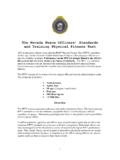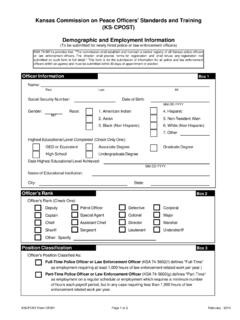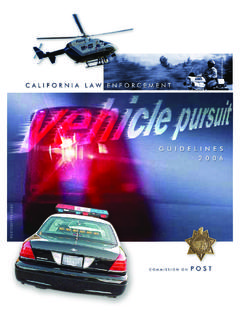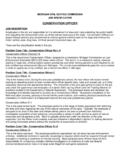Transcription of What you need to know about this Skills programme
1 academy of Business and Computer Studies What you need to know about this Skills programme Explain this Road Traffic Management (Road Traffic Law Enforcement) Skills programme to me this is a Skills programme offered in modular format, a part of the qualification National Certificate: Road Traffic Law Enforcement. The Skills programme will provide the basic knowledge, Skills and values needed for learners who wish to pursue a career in the road traffic law enforcement field. Learners achieving this Skills programme have the opportunity to study further for a full qualification of the Road Traffic Law Enforcement, National Certificate: Tactical Road Traffic Operations, Policing, and generic Management, employment in the transport sector or any private sector that recognises and requires these Skills . The Skills programme is a requirement for anyone who is already in the traffic enforcement field who wants to get formal training and upgrade the old Traffic Diploma or acquire nationally recognised and credit bearing achievements.
2 In the case of Traffic Officers or anyone with recognized experience the qualification can be achieved through Recognition of Prior Learning (RPL) Learners will be provided with the theoretical knowledge and practical competencies as required. Road Traffic Management Course: Total Credits 117 SAQA ID Unit Standard title Level Credits Module 1 (integrated modules): Business Communication and Numeracy 119472[8968] Accommodate audience and context needs in oral/signed communication 3 5 119462[8974] Engage in sustained oral communication and evaluate spoken texts 4 5 119469[8975] Read analyse and respond to a variety of texts 4 5 119459[8976] Write for a wide range of contexts 4 5 119457[8969] Interpret and use information from texts 3 5 119465[8970] Write texts for a range of communicative contexts 3 5 119467 Use language and communication in occupational learning programmes 3 5 119471 Use language and communication in occupational learning programmes 4 5 9016 Represent analyse and calculate shape and motion in 2-and 3-dimensional space in different contexts 4 4 7468 Use mathematics to investigate and monitor the financial aspects of personal, business, national and international issues 4 6 9015 Apply knowledge of statistics and probability to critically interrogate and effectively communicate findings on life related problems 4 6 Module 2.
3 Road Traffic Legislation 256519 Demonstrate an understanding of the legislative framework for road traffic law enforcement 4 10 377224 Demonstrate an understanding of the role and functions of a Peace Officer and Traffic Warden 04 8 256527 Apply knowledge of road traffic legislation pertaining to traffic officers, road users and vehicles 4 14 academy of Business and Computer Studies 256525 Apply knowledge of the National Land Transportation Transition Act 4 3 377222 Apply knowledge of the Land transport legislation 4 3 Module 3: Work Ethics & Officer Duties 243263 Demonstrate knowledge and understanding of anti-corruption issues in a public sector 4 5 120476 Adhere to professional ethics 5 4 120486 Demonstrate physical defensive restraining techniques 5. 6 Module 4: Transport and operation Legislation Core 256523 Apply knowledge of legislation regarding dangerous goods and substances conveyed by road 04 4 256526 Apply knowledge of the Cross Border Road Transportation Act 04 3 256517 Demonstrate understanding of the Administrative Adjudication of the Road Traffic Offences Act (AARTO) 04 4 Module 6: Workplace Health and Safety Techniques 116534 Carryout basic first aid treatment in a workplace 3 2 120331 Demonstrate knowledge pertaining to fires in workplaces 3 3 Optional Module: Module 5 : Safety incident Management 119039 Set up sectors 5 6 119031 Assess and analyse an incident 5 6 119035 Isolate and secure a scene 5 6 1.
4 On successful completion of the Skills programme , candidates are accredited with relevant Unit Standard and registered on the National Learner Database by SASSETA, Issued with SETA statement results and SETA approved Provider Certificate. Note that if a candidate wishes to complete the full qualification, which can be done at any time after completing the Skills programme , he/she should study at any Institution of his/her choice and be assessed on the remainder of the Unit Standards only to qualify. Note also that the Qualification recognizes Recognition of Prior Learning (RPL). 2. The Skills programme is mainly Theory based and candidates are encouraged to get letters of attachment from their campuses and seek their own workplace training to enhance chances of employment; some municipalities are willing to assist. ABCS will organize practical training on Restraint Technique and Marching and fire Drills at additional cost as advised.
5 Note that academy of Business and Computer Studies does not have the capacity to run the remainder of the practical training. 3. this Skills programme is a component of the same programme that is offered at any Public Road Traffic school which is accredited by SASSETA and is assessed and moderated by SASSETA registered Assessors and Moderators. 4. Employment is not guaranteed but other former students of the programme have been employed by Municipalities or at Provincial level, Dep of Transport, others are undergoing practical training with various municipalities. Why are we not doing the full qualification? The National Training Framework (NTF) for Road Traffic Management intended to determine the role of private providers on the provision of the Road Traffic Law Enforcement qualification is still pending and was then set to be finalized by end of 2011.
6 Up-to and until academy of Business and Computer Studies its finalization private provider may not offer the full qualification. Further to this , certain sections of the full qualification require specialized equipment and methods/ operating procedures to undertake to which academy either doesn t have capacity or certain legislation(s) don t permit setting-up a roadblock. The Skills Development Act (No. 97 of 1998) and further amendments thereof however allows for the provision of Skills programme in Unit Standards or clusters of Unit Standards as an alternative method of attaining the full qualification. We are therefore proud to be fully accredited and fully participating in the alleviation for Skills shortages in the country Background What is the role of SAQA? The South African Qualifications Authority (SAQA) is a statutory body, established in terms of the SAQA Act, No.
7 58 of 1995. SAQA is mandated by legislation to oversee the development and implementation of the National Qualifications Framework (NQF). SAQA together with the three Quality Councils (QCs) must seek to advance the objectives of the NQF by: Developing, fostering and maintaining an integrated and transparent national framework for the recognition of learning achievements Ensuring that South African qualifications meet appropriate criteria, determined by the Minister of Education and are internationally comparable and Ensuring that South African qualifications are of an acceptable quality. Communicating the NQF to the public Facilitating research initiatives and disseminating the outcomes thereof Evaluating foreign qualifications What is a SETA SETA is the acronym for Sector Education and Training Authority. These are industry bodies convened by the Minister of Labour with the mission to develop and implement a sector specific Skills plan, registering and promoting learnerships and applying to SAQA for accreditation as an Education and Training Quality Assurance Body (ETQA) for qualifications in its sector How does academy fit into SAQA?
8 SAQA accredits ETQAs to monitor and audit learning achievements in terms of those unit standards and qualifications as registered on the National qualifications framework (NQF). ETQAs, in turn, accredit providers on registered Qualifications or part Qualification so that they can train on them and academy is a provider. Which SETA do we belong to? Originally we are accredited by Local Government SETA but with the new changes all security related Qualification (including Road Traffic Law Enforcement Qualification) and Skills programmes were moved to SASSETA. We are now Accredited by SASSETA What is the NQF, and how did it come into being? The National Qualifications Framework (NQF) is a Framework on which standards and qualifications, agreed to by education and training stakeholders throughout the country, are registered. It came into being through the South African Qualifications Authority Act (No.)
9 58 of 1995, Government Gazette No. 1521, 4 October 1995), which provides for the development and implementation of a National Qualifications Framework . Who is UMALUSI? UMALUSI Quality Council sets and monitors standards for general and further education and training in South Africa, in accordance with the General and Further Education and Training Quality Assurance Act, 2001 academy of Business and Computer Studies What is Qualification? A quality or accomplishment that makes someone suitable for a particular job or activity OR The action or fact of becoming qualified as a practitioner of a particular profession or activity. Our SASSETA accreditation full programme approval 111999691947 What is a Skills programme ? A Skills programme consists of a unit standard or group of unit standards that is large enough for the outcome to allow for the learner to become employable.
10 Skills programmes do not result in a qualification themselves upon completion, but will lead to a full qualification. Skills programmes allow for Skills to be acquired that provide immediate access to income generation. How do you get Accreditation? Accredited Colleges, accredited universities, and accredited schools have voluntarily undergone a formal evaluation process by a impartial trusted professional society, non-governmental body, or government agency and has been granted official approval, credit or recognition for meeting or exceeding specific criteria, requirements or standards. What is Accreditation for? Accreditation is meant to serve as an impartial independent verification that ensures that institutions are meeting quality and national standards Why don t you give us Uniform? And Traffic Numbers? All students of the Road Traffic Management programme are NOT Traffic Cops and ABCS is not a Traffic School and therefore does not have the mandate to give Uniforms or Traffic Numbers.




